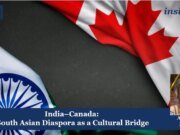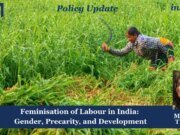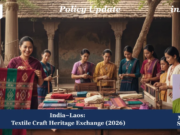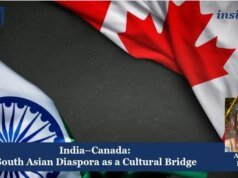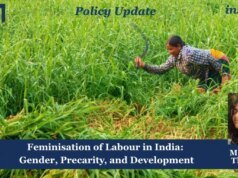Policy Update
Nitika Kumari
The PRAVASI BHARATIYA SAHAYATA KENDRA earlier known as the Overseas Workers Resource Centre (OWRC) serves as the Government of India’s primary mechanism for addressing the welfare and protection needs of overseas Indian communities, particularly migrant workers. Established to combat exploitation and streamline support systems, PBSK operates under the Ministry of External Affairs (MEA) with a mandate rooted in emergency assistance, legal empowerment, and preventive diplomacy.
This critical support system was established to meet the growing needs of millions of Indians working abroad, particularly in countries with large Indian diaspora communities. The PBSK mandate covers a wide array of services such as legal support, financial advice, medical assistance, and psychological counseling. The centers also undertake verification of employment offers obtained by Indians from firms in respective nations to guard against mischievous employment schemes.
Background and Evolution
The PBSK system evolved from the Indian Workers Resource Centre (IWRC) initiative first opened in Dubai on November 23, 2010. IWRC began its operations in Dubai to offer support to Indian workers in the UAE, and later, a new IWRC center was inaugurated in Sharjah on August 15, 2017. In a new development, the competent authority resolved to rename IWRC centers as ‘Pravasi Bharatiya Sahayata Kendra (PBSK)’ with effect from October 2018. The rebranding indicated the broader scope and greater emphasis on offering all-rounded support to all categories of Indian expatriates, rather than workers alone. The growth of PBSK centers was strategic, directed towards countries with the largest pool of Indian workers and diaspora communities.
Objectives and Strategic Mandate
- Serving as a single window facility to offer extensive support services to Indian workers abroad for employment-related purposes.
- Cooperation with help groups, individuals, social workers, and associated bodies to provide services to members of the Indian community.
- Disposing of complaints and grievances quickly, offering remediation, when necessary, through a 24-hour helpline system.
- Verification of the authenticity of job offers received by Indians from organizations in respective countries.
- To offer counseling and advice on every issue related to overseas Indian workers.
- To offer urgent assistance in times of crisis and emergencies.
- To inform workers regarding their rights, government schemes, and welfare programs.
Target Demographics
The PBSK system primarily serves Indian expatriates falling under various categories:
- Emigration Check Required (ECR) category workers
- Non-ECR passport holders (voluntary registration)
- Skilled and semi-skilled workers
- Domestic workers
- Construction industry workers
- Service sector employees
- Students and their families (emergency assistance)
Operational Framework
PBSK is administered under the administrative structure of the Ministry of External Affairs (MEA) and works as expert cells at Indian Embassies and Consulates. Every PBSK center is serviced by trained officers with expertise to deal with the complex problems of Indian expatriates.
Service Delivery Mechanism
The operational structure of the Pravasi Bharatiya Sahayata Kendra (PBSK) is designed with several channels of service delivery to provide overall support to overseas Indians. It has 24×7 toll-free helplines for constant support and walk-in services through physical centers within diplomatic premises, with dedicated consultation rooms to ensure confidentiality. PBSK also utilizes digital platforms like email support, WhatsApp communication, online grievance registration portals, and mobile applications for ease of access. It also has a robust social media presence, utilizing Twitter for updates in real-time and Facebook pages to create a community presence.
Domestic Support Centres
Apart from overseas PBSK centers, 6 Kshetriya Pravasi Sahayata Kendra (KPSK) also function in India at Delhi, Lucknow, Hyderabad, Chennai, Patna, and Kochi to help emigrants and their families. The helpline numbers act as lifelines for the Indian community overseas, with counseling facilities for employment grievances, legal assistance, medical emergencies, and repatriation assistance in key destination countries for Indian manpower.
Implementation and Service Delivery
PBSK centres leverage state-of-the-art technology infrastructure to enhance the delivery of services, using high-end IT systems for grievance tracking, monitoring, and database management of registered workers. These systems are interconnected with the MADAD portal for efficient grievance management, and mobile apps are provided for easy access to services. Furthermore, PBSK follows a public-private partnership system, where the private sector players such as Alankit have a major role in setting up and running centers in places like Dubai and Sharjah. This joint venture method helps adopt professional standards of service, effective usage of resources, scalability of operations, and access to technical knowledge in service management.
The Pravasi Bharatiya Sahayata Kendras (PBSKs) function within the overall umbrella of the Ministry of External Affairs, specifically managed through the Overseas Employment & Protector General of Emigrants (OE & PGE) Division. These centers work in close coordination with key institutions such as the Protector of Emigrants (PoE) offices, the Indian Community Welfare Fund (ICWF), and the eMigrate portal. This integrated strategy guarantees that Indian emigrants get streamlined support and welfare services overseas.
The coordination with PoE offices facilitates the redressal of grievances and face-to-face counseling, while financial assistance is provided in cases of emergencies by the ICWF. The eMigrate portal enhances this support system even further by giving a complete electronic platform for information, grievance redressal, and emigrant welfare monitoring. All these mechanisms collectively allow PBSKs to provide efficient and timely assistance to Indian citizens abroad.
In its first year of operation, after its relocation to the Indian Consulate premises on November 1, 2020, the Pravasi Bharatiya Sahayata Kendra (PBSK), Dubai helped over 33,000 members of the Indian community in the UAE. According to information available on the Madad and e-Migrate Portals, 26,730 grievances related to compensation, wage theft, and residual payments were registered by Indian citizens from 2020-2023. During this period, 29,640 grievances were resolved (including some grievances registered in previous years).
PBSK operates in partnership with other government welfare programs to increase assistance to overseas Indians. For example, it is working in tandem with the Pravasi Bharatiya Bima Yojana (PBBY), an insurance program that protects the interests of Indian emigrants. The scheme offers ₹10 lakh insurance for accidental death or permanent disability. Medical expenses are reimbursed up to ₹1 lakh total, with a maximum of ₹50,000 per hospitalization. For female workers, maternity benefits up to ₹50,000 are included. In cases of medical unfitness or early termination of employment, it covers one‑way economy-class airfare for repatriation to India.
Additional benefits include legal expense reimbursement up to ₹45,000 for litigation related to overseas employment, and family hospitalization cover in India up to ₹50,000 per year for the spouse and up to two children. According to official data from the Ministry of External Affairs, More than 79 lakh (7.9 million) insurance policies have been issued under PBBY from 2006-07 to September 30, 2024. During this period, 3,190 claims were received and 2,194 were settled, providing crucial financial support to Indian workers and their families.
Challenges and Limitations
Limited physical presence compared to the vast geographic spread of the Indian diaspora is a core limitation. The lack of sub-centers in such distant or under-served locations restricts timely access to services for large numbers of workers in distress.
Even with increased demand, PBSK centers tend to have few staff members, infrastructure, and funding. This limits their capacity to receive a large number of grievances, respond promptly, or send mobile outreach units, particularly in emergency or crisis-related situations. Adequate staffing relative to complaint volumes is critical despite digital innovations. Optimal ratios ensure timely responses, reduce burnout, and maintain service quality.
A large portion of Indian emigrants are not aware of the availability or extent of PBSK services. This is especially so for low-skilled or semi-skilled laborers, who might not have access to the internet or exposure to campaigns to raise awareness on this matter, leading to awareness Gaps.
PBSK operations should be more integrated with other government programs and online systems like MADAD, eMigrate, ICWF, and PoE offices. Fragmentation across such systems tends to cause duplication, time loss, and confusion in the redressal of grievances, decreasing efficiency and effectiveness as a whole.
Host country laws, administrative processes, and bilateral arrangements tend to place restrictions on the kind of assistance PBSK can provide. Legal limitations may curtail legal assistance, mediation into labor-management cases, or repatriation procedures. Keeping an updated and exhaustive database of Indian expatriates continues to be a key challenge. Inaccuracies in data, inconsistencies in platforms, and the absence of real-time feedback impact PBSK’s capacity to provide focused services, analyze trends, and design policy interventions.
Way Forward and Recommendations
In order to enhance the impact and outreach of the Pravasi Bharatiya Sahayata Kendra (PBSK), there is a need for a multi-pronged approach. Geographic expansion should be aimed at opening new centers in nations with high Indian diaspora populations, including sub-centers or mobile units in areas not served fully. Simultaneously, digitalization has to feature augmented multilingual mobile applications, AI-driven chatbots for preliminary grievance redressal, blockchain-based secure document management, and virtual reality orientation programs for migrant laborers.
Efforts to enhance services must incorporate proactive outreach via awareness campaigns in labor accommodation zones, partnership with diaspora communities and recruitment agencies, and incorporation of educational materials into airport departure processes. Capacity building can be accomplished by equipping PBSK personnel with training on new legal and technological issues, developing standard operating procedures, and engaging with local legal professionals and social workers.
On the policy side, institutional enhancement requires more funding, the creation of a specialized PBSK cadre in the MEA, performance monitoring mechanisms, and the creation of outcome-based indicators. Between-agency coordination should be enhanced by synergizing actions with ministries like Skill Development, Labour and Employment, state governments for family support, and educational institutions for collaborative research.
Lastly, the next growth phase must be led by technology and innovation in the form of predictive analytics, early warning systems on employment challenges, real-time dashboards, and machine learning-based tools for identifying patterns in grievances. Real-time communication platforms, real-time translation, remote access through video conferencing, and social media connectivity will further enhance service delivery and interaction with the Indian diaspora.
References
- Ministry of External Affairs. (n.d.). Indian Community Welfare Fund (ICWF). https://www.mea.gov.in/icwf.htm
- Ministry of External Affairs. (n.d.). Protectors of Emigrants: States/Union Territories. https://www.mea.gov.in/Images/attach/Protectors_Emigrants_States_Union_Territories_new.pdf
- Ministry of External Affairs. (n.d.). Divisions of MEA. https://www.mea.gov.in/divisions.htm
- Lok Sabha Secretariat. (2018). Report No. 51: Standing Committee on Labour on welfare of Indian emigrant workers particularly in the Gulf region (16th Lok Sabha). https://eparlib.nic.in/bitstream/123456789/783622/1/16_Labour_51.pdf
- Ministry of External Affairs. (n.d.). Pravasi Bharatiya Sahayata Kendra (PBSK). Heal by India. https://healbyindia.gov.in/static/media/Pravasi_Bharatiya_Sahayta_Kendra_new.a60f4dd4ebb63533b813.pdf
- Ministry of External Affairs. (n.d.). MADAD multilingual interface. https://madad.gov.in/AppConsular/onlineHtml/mobRegionalLanguage.html
- Embassy of India, UAE. (2018, November 21). Launch of Pravasi Bharatiya Sahayata Kendra (PBSK). https://www.indembassyuae.gov.in/press-2018-sahayata.php
- Ministry of External Affairs. (n.d.). OWRC and PBSK. https://www.mea.gov.in/owrc-and-pbsk.htm
- Consulate General of India, Dubai. (n.d.). PBSK awareness update. https://www.cgidubai.gov.in/alert_detail/?alertid=168
- Gulf Today. (2021, January 21). Mobile app launched to help Indians in distress. https://www.gulftoday.ae/News/2021/01/21/Mobile-app-launched-to-help-Indians-in-distress
- Ministry of External Affairs. (n.d.). Request for Proposal: Pravasi Bharatiya Sahayata Kendra (PBSK). https://www.mea.gov.in/Portal/Tender/3773_1/1_RFPforPBSK__1_-1.pdf
- Alankit Group. (2020). Corporate brochure. https://www.alankit.com/images1/Alankit_Brochure-2020.pdf
- Ministry of External Affairs. (n.d.). Helplines – Gulf & Malaysia. https://www.mea.gov.in/Images/pdf/helplines-gulf-malaysia.pdf
- Ministry of External Affairs, Consulate General of India, Hamburg. (n.d.). Information [PDF]. https://www.cgihamburg.gov.in/pdf/INFORMATION_may15.pdf
- Ministry of External Affairs. (n.d.-a). Pravasi Bharatiya Bima Yojana. https://www.mea.gov.in/pbby.htm
- Ministry of External Affairs. (n.d.-b). Lok Sabha Q&A: Question No. 3011 – Pravasi Bharatiya Bima Yojana. https://www.mea.gov.in/lok-sabha.htm?dtl/38128/QUESTION+NO3011+PARVASI+BHARATIYA+BIMA+YOJANA
- Ministry of External Affairs. (n.d.-c). Lok Sabha Q&A: Question No. 4052 – Emigration Act. https://www.mea.gov.in/lok-sabha.htm?dtl/36411/QUESTION_NO4052_EMIGRATION_ACT
- Gulf News. (2023, November 27). Help centre under the Indian Consulate in Dubai reaches out to 33,000 expats. https://gulfnews.com/uae/help-centre-under-indian-consulate-in-dubai-reaches-out-to-33000-expats-1.83371118
About the Contributor: Nitika Kumari is a postgraduate student of Defence and Strategic Studies at the Central University of Gujarat (2024–2026). Her core research interests include classical and contemporary strategic thought, India’s national security environment, and the evolving nature of warfare.
Acknowlegement: The author sincerely thanks Ms. Aasthaba Jadeja and the IMPRI team for their valuable support.
Disclaimer: All views expressed in the article belong solely to the author and not necessarily to the organisation.
Read more at IMPRI:
Technology Mission Programme on Water and Clean Energy (TMPWCE)
All India Survey on Higher Education (AISHE), 2011: Data Governance in Academic Landscape in India


